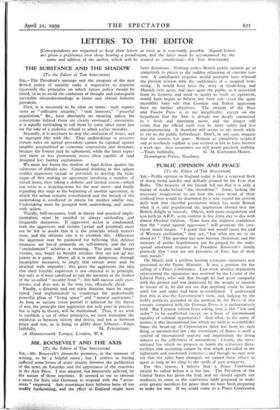LETTERS TO THE EDITOR
[Correspondents are requested to keep their letters as brief as is reasonably possible. Signed letters are given a preference over those bearing a pseudonym, and the latter must be accompanied by the name and address of the author, which will be treated as confidential.—Ed. THE SPECTATOR]
THE SUBSTANCE AND THE SHADOW
[To the Editor of THE SPECTATOR]
SIR,—The President's message and the progress of the new British policy of security make it imperative to examine rigorously the principles on which future policy should be based, so as to avoid the confusion of thought and consequent inevitable misunderstandings at home and abroad hitherto prevalent.
First, it is necessary to be clear on terms : such expres- sions as "collective security," "vital interests," "peaceful negotiation," &c., have absolutely no meaning unless the conceptions behind them are clearly envisaged ; conversely, it is equally misleading to call them by some other name just for the sake of a pedantic refusal to admit earlier mistakes.
Secondly, it is necessary to stop the confusion of issues, and to segregate like with like. Thus undertakings to preserve certain rules on agreed procedure cannot be equated against tangible geographical or economic concessions and demands, because the former may be ephemeral, while the latter repre- sent more or less permanent assets often capable of (and designed for) further exploitation.
We must not barter the shadow of legal fiction against the substance of definite acts. Confused thinking in this sphere enables aggressors (actual or potential) to develop the tech- nique of first making an agreement involving a number of mixed, items, then taking a definite and limited action—which can serve as a stepping-stone for the next move—and finally regarding this stage as the beginning of another agreement, in which the action remains consolidated and the breach of the undertaking is condoned in return for another sit:au one. Undertaking must be grouped with undertaking, and action with action.
Thirdly, half-measures, both in theory and practical imple- mentation, must be avoided as always misleading and frequently - dangerous. If aggressive action is condemned, both the aggressors and victims (actual and potential) must not be left in doubt that it is the principle which matters most, and the ultimate aim is to establish this. Otherwise the aggressor may be pardoned for believing that defence measures are based primarily on self-interest, and the cry " encirclement " achieves a meaning. The past and future victims, too, begin to wonder whether they are not ad hoc pawns in a game. Above all it is most dangerous, through incomplete measures, to imply that certain areas may be attacked with impunity : this gives the aggressors the idea that their forcible expansion is not objected to in principle, but only as it were canalised to suit the interests of the leaders of the so-called "security front ": this half-success only exas- perates and does not, in the long run, effectively check.
Finally, a dynamic and not static doctrine must be enun- ciated (and implemented) to counteract the undoubtedly powerful pleas of "living space" and "natural aspirations." As long as success (even partial) is achieved by the threat of war, the principle that aggression not only pays in practice, but is right in theory, will be maintained. Thus, if we wish to establish a set of other principles, we must formulate the antithesis as between victory and defeat, and not as between peace and war, as is being so glibly done hitherto.—Yours










































 Previous page
Previous page